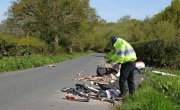Stewart concerned over CEP targets
Resource Minister Rory Stewart voiced has concerns over the new targets set by the European Commission’s Circular Economy Package last year, suggesting that they could be ‘overly complex’.
Speaking on behalf of the UK at the European Environment Council on Friday (4 March), Stewart praised the proposals for reducing the burden on businesses, and the emphasis on the voluntary approach of the action plan in the package, but highlighted ‘overarching concerns’ with the targets, stating that they might be ‘overly complex’.
The package, the details of which were first announced by the European Commission in December, set common EU targets of 65 per cent recycling of municipal waste and 75 per cent recycling of packaging waste by 2030, with a binding target to reduce landfill to maximum of 10 per cent of all waste by the same year.
Stewart told the assembled group of European environment ministers that he wants the Commission to recognise work that has already been achieved by member states and would like to see an analysis of the cost-benefits of the targets.
The UK, according to Stewart, is particularly interested in the ‘top-half’ of the circular economy – production and consumption, especially ecodesign. The minister said that he is ‘proud’ of what the UK has done so far; creating 10,000 jobs out of industrial symbiosis projects. He also paid tribute to the efforts of Wales and Scotland, which have both taken steps to move their circular economy transitions on in recent weeks.
Stewart also welcomed the North Sea Roundabout Initiative, launched by the Netherlands, which aims to ‘see a great increase in the flow of circular economy goods and services between the countries bordering the North Sea thanks to the use of harmonised standards and regulations’.
The minster said: “The bits that excite us most are the emphasis on reducing the burden on business, the emphasis on the voluntary approach and we are also particularly interested in the top half of the circular economy around the issues of production and consumption. [We are] particularly interested in eco design, industrial symbiosis, we would like to see more there and to work with you more closely on that.”
Targets proven to be ‘achievable’
The meeting addressed the priorities and challenges presented by the action plan from an environmental perspective ahead of it being adopted in the council on 20 June.
Karmenu Vella, Commissioner for the Environment, Maritime Affairs and Fisheries, highlighted the benefits from the transition to a circular economy so far, claiming that EU businesses had saved €600 billion, which is approximately equivalent to eight per cent of their annual turnover. He said it has also created 580,000 jobs and reduced carbon emissions by 450 million tonnes per year.
Regarding Stewart’s issues with the targets set out in the package, Vella said: “I would remind you that the targets which we have proposed are proven to be achievable by several member states and if you are not achieving those recycling grades then unfortunately you are literally burying valuable resources in the ground or burning them.”
Vella urged member states to work together on some issues, for example food waste and said that they need to work at an EU level to achieve the Sustainable Development Goal target of halving food waste by 2030.
Landfill, food waste and the refugee crisis
Environment ministers from other countries presented their views on the package. Denmark’s representative pledged support to the ‘ambitious’ landfill target but stressed that the action plan could be stronger on product policies and should underline the importance of bioeconomy.
The French minister meanwhile said that the action plan ‘lacks precision’ and challenged its food waste policy, asking why there is no mention of what happens to unsold food. The French parliament last month unanimously passed a law requiring supermarkets to take action against the wasting and destruction of surplus food.
The minister for Greece said that the increased refugee crisis has ‘created a new need’, saiying that Greece now has to manage volumes of new waste on the basis of specific equipment, but they plan to turn this ‘problem’ into an economic activity.
The full webcast of the Environmental Council is available at the European Council website.






